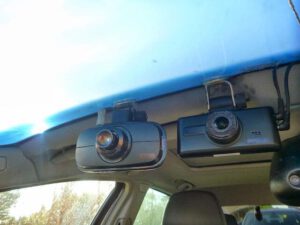Dash Cams and Auto Accidents

Dashboard cameras have been gaining traction in the U.S. over the last two years.
Multiple dash cam recordings of the Chelyabinsk meteor exploding over Russia in 2013 initially increased awareness.
As more Americans began using dash cams, online videos of accidents began appearing, and those videos often showed situations where one driver was deemed to be at fault… until the recording from the dash cam was presented.
Dash cams have also been steadily decreasing in price, with quality models now selling for around $100.
Legal Implications of Dashboard Cameras in Colorado
It’s clear that dash cams are becoming more popular, but what are the legal implications of owning one? The first thing to be aware of is whether the dash cam would obstruct your view.
Although windshield obstruction laws and their enforcement vary greatly by state, Colorado has no law restricting or banning the use of windshield mounts.
Wiretapping laws may also be relevant depending on what kind of camera you purchase. Visual recording is protected, but cameras that record audio may violate wiretapping laws in some states.
Most states require only one party to consent to the recording; however, 12 states require all parties to consent to being recorded: California, Connecticut, Florida, Illinois, Massachusetts, Michigan, Montana, Nevada, New Hampshire, Pennsylvania and Washington.
When driving through one of these states, you should either disable the audio recording function of your device or obtain consent from anyone being recorded.
It is not usually necessary to obtain consent from police, as on-duty police officers have no expectation of privacy.
However, Massachusetts requires the recording device to be in plain view. Illinois wiretapping law prohibited citizens from recording police, but that law was declared unconstitutional in 2014.
There are currently no restrictions on recording in any situation in Illinois, but that will likely change when a new wiretapping law is passed.
Is Dash Cam Footage Admissible in Court?
As long as wiretapping laws are not violated, dash cam video is admissible in court and can be used to prove liability in the case of an auto accident.
However, be aware that the video could also hold you partially liable for the accident if you made an error prior to the crash.
Dash cam recordings can also be submitted to insurance companies to demonstrate liability and prevent insurance fraud, and this could hold you additionally accountable, as well, even if you are the victim in the automobile altercation.
Regardless, to ensure that the camera captures the circumstances leading to an accident, careful positioning is recommended.
Most dash cams feature wide angle lenses and some also feature an additional lens to record through the rear window in case of an accident coming from behind.
Many cameras record the location of the car using GPS, and some record G-forces inside the vehicle in order to measure the severity of a collision.
Dashboard cameras can also record interactions with police officers, protecting you from illegal action during a traffic stop.
Unfortunately, laws regarding the search and seizure of footage from a dash cam are currently unclear, and enforcement is not uniform.
Colorado allows personal electronic devices to be searched without a warrant if you are arrested, and police may seize camera footage if they believe it contains evidence of a crime. Learn more at: www.zanerhardenlaw.com.
Contact our Denver Car Accident Law Firm Today For Help
For more information please contact Zaner Harden Personal Injury Lawyers to schedule a free initial consultation with a Denver car accident lawyer.
Zaner Harden Personal Injury Lawyers
1610 Wynkoop Street, Suite 120. Denver, CO 80202
(720) 613 9706

